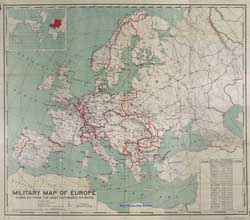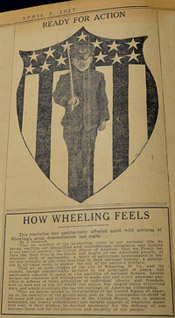
By Tiana Hall
Governor's Intern
Chapter One
Setting the Stage for War
|
World War I, also known as "The Great War" or "The War to End All Wars," was an international conflict that occurred from 1914 to 1918 and involved two groups of countries: the Central Powers, consisting of Germany, Austria-Hungary, and Turkey, against the Allies, consisting of France, Great Britain, Russia, Italy, Japan, and the United States. The origins of the war are more complex and less clear than those of World War II, but scholars and historians believe it to be centered around the assassination of heir to the throne of Austria-Hungary, Archduke Franz Ferdinand, by Serbian nationalist, Gavrilo Princip, on June 28, 1914. Ferdinand's assassination created a diplomatic crisis that invoked clashes amongst international alliances, which spread into a world war.1
|

Military Map of Europe, 1914
West Virginia State Archives
|
This year, 2017, marks the 100th anniversary since the U.S. entered the war on April 6, 1917. President Woodrow Wilson decided to enter the war for several reasons. In March of 1916, German submarines sunk an unarmed French boat, called the Sussex, in the English Channel, and in response, President Wilson threatened to sever diplomatic ties between the U.S. and Germany, unless the German Government no longer attacked passenger ships. The German Government accepted the U.S.'s terms on May 4, 1916 in what came to be known as the "Sussex pledge." However, German policymakers decided to violate the "Sussex pledge," because the United States had been supplying armaments and money to the Allies, as well as supporting the Allied blockade of Germany. Angered by the United States' actions, the Germans attempted to form an alliance with Mexico against the U.S., which was discovered in the Zimmermann Telegram. On January 19, 1917, British naval intelligence intercepted and decrypted the telegram sent by German Foreign Minister Arthur Zimmermann to the German Ambassador in Mexico City. The telegram promised the Mexican Government that Germany would aid Mexico in recovering the territory it had ceded to the United States after the Mexican-American War, in exchange for Mexico's support of Germany in the World War I. Shortly after Zimmerman Telegram was revealed to the U.S. by the British, Wilson declared war on Germany.2

Wheeling News Register, April 3, 1917
|
West Virginia's Governor John J. Cornwell made this statement ".it is the duty of every good citizen to aid his country in every way possible, the least of which is to aid the soldiers of his country in the discharge of their duties and to submit to any temporary inconvenience without complaint."3 West Virginians must have listened to the Governor's message because they served in the war at a higher ratio than any other state. Those who were not able to participate in the armed conflict abroad, contributed to the war effort at home as both men and women of all ages and races were involved with the Red Cross, Defense Council, canning clubs, or the growing of victory gardens. Although, most of these men and women's accomplishments have gone unnoticed because World War I is overshadowed by World War II, as World War II is more widely discussed, studied, and written about. Despite this, strategies and equipment of World War I such as trench warfare and airplanes were adopted in World War II, as were ration books and liberty loans. World War I set the precedence for World War II, as did the patriotism, loyalty, and bravery demonstrated by our very own West Virginians who were involved.4 |
Citations
1. Royde-Smith, John Graham. "World War I." Encyclop dia Britannica. Encyclop dia Britannica, Inc., 09 Dec. 2016. Web. https://www.britannica.com/event/World-War-I. Accessed 26 June 2017. Accessed 12 July 2018.
2. "U.S. Entry into World War I, 1917." Office of the Historian. Office of the Historian and Bureau of Public Offices, United States Department of State. Web. https://history.state.gov/milestones/1914-1920/wwi. Accessed 12 July 2018.
3. Quoted in "Important Anniversaries in United States and West Virginia History," West Virginia Historical Society Magazine, vol. 31, no. 1 (Spring 2017): 8.
4. Cornwell, John J. "West Virginia in the War." West Virginia Legislative Hand Book and Manual and Official Register 1918, ed. John T. Harris. (Charleston, WV: The Tribune Printing Co., 1918), 777-778.
|



